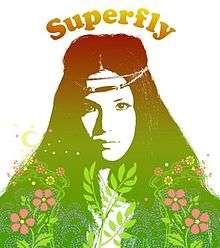
Super Fly (film)
Super Fly is a 1972 blaxploitation, crime drama film directed by Gordon Parks, Jr., starring Ron O'Neal as Youngblood Priest, an African American cocaine dealer who is trying to quit the underworld drug business.
This film is probably best known for its soundtrack, written and produced by soul singer Curtis Mayfield. Super Fly is one of the few films ever to have been outgrossed by its soundtrack.
Leading man O'Neal reprised his role as Youngblood Priest and directed a sequel to the film that was released a year later in 1973, Super Fly T.N.T. Super Fly producer Sig Shore directed a second sequel in 1990, The Return of Superfly.
Plot
Youngblood Priest (Ron O'Neal) is an up-and-coming cocaine dealer in New York City. On his way to a meeting point in Harlem early one morning he is mugged by two junkies. Priest beats one up and gives chase to the other, beating him until he gets the money back. Afterwards, Fat Freddie and Nate Adams, Priest's main dealers, turn up at his apartment to make their payments. Later that night, Priest and Eddie arrive at Scatter's restaurant. The pair then goes on to sell a kilo of cocaine. Priest and Eddie arrive in a bar in Harlem to meet a potential buyer. While they are waiting, three black activists approach them and try to shake Priest down. Priest demands they leave. Their buyer arrives, samples the cocaine and agrees to make a deal.
Superfly
Superfly or Super fly may refer to:
Film and music
- Super Fly (soundtrack), a 1972 Curtis Mayfield soundtrack to the film
- "Superfly" (song), the album's title track
- Superfly (Superfly album), the rock unit's debut self-titled album
People
Superfly (band)
Superfly is a Japanese rock act that debuted on April 4, 2007. Formerly a duo, the act now consists solely of lyricist and vocalist Shiho Ochi with former guitarist Kōichi Tabo still credited as the group's composer and part-time lyricist. Superfly's first two studio albums have been certified double platinum by the Recording Industry Association of Japan, and their four albums (the third being classified as a "single" by the group) all debuted at the top of the Oricon's Weekly Album Charts, a first for a female recording artist in Japan in over seven years.
History
2003–2006: Formation
Shiho Ochi (越智 志帆, Ochi Shiho) met Kōichi Tabo (多保 孝一, Tabo Kōichi) in 2003 while they were students at Matsuyama University. They were both members of a music circle that covered songs by Finger 5 and the Rolling Stones. In 2004, the group formed the blues band "Superfly", naming themselves after Curtis Mayfield's song "Superfly". The group disbanded in 2005, with only Ochi and Tabo remaining when they went to Tokyo to seek out a label.

Superfly (Superfly album)
Superfly is the debut studio album by Japanese band Superfly released on May 14, 2008. Approximately 391,182 copies have been sold in Japan and is certified Double Platinum by the RIAJ for the shipment of 500,000 copies. On the iTunes Store, a special remix of "Manifesto" by Ram Rider was included.
Superfly debuted at number 1 on the Oricon's weekly album charts; the last time a female artist had their first album debut at number 1 was Tina's Colorado in 1999.
Tracklist
Charts (Japan)
References
Film (Iranian magazine)
Film (Persian:فیلم) is an Iranian film review magazine published for more than 30 years. The head-editor is Massoud Mehrabi.
References
External links

Film (film)
Film is a 1965 film written by Samuel Beckett, his only screenplay. It was commissioned by Barney Rosset of Grove Press. Writing began on 5 April 1963 with a first draft completed within four days. A second draft was produced by 22 May and a forty-leaf shooting script followed thereafter. It was filmed in New York in July 1964.
Beckett’s original choice for the lead – referred to only as “O” – was Charlie Chaplin, but his script never reached him. Both Beckett and the director Alan Schneider were interested in Zero Mostel and Jack MacGowran. However, the former was unavailable and the latter, who accepted at first, became unavailable due to his role in a "Hollywood epic." Beckett then suggested Buster Keaton. Schneider promptly flew to Los Angeles and persuaded Keaton to accept the role along with "a handsome fee for less than three weeks' work."James Karen, who was to have a small part in the film, also encouraged Schneider to contact Keaton.
The filmed version differs from Beckett's original script but with his approval since he was on set all the time, this being his only visit to the United States. The script printed in Collected Shorter Plays of Samuel Beckett (Faber and Faber, 1984) states:

Lubrication theory
In fluid dynamics, lubrication theory describes the flow of fluids (liquids or gases) in a geometry in which one dimension is significantly smaller than the others. An example is the flow above air hockey tables, where the thickness of the air layer beneath the puck is much smaller than the dimensions of the puck itself.
Internal flows are those where the fluid is fully bounded. Internal flow lubrication theory has many industrial applications because of its role in the design of fluid bearings. Here a key goal of lubrication theory is to determine the pressure distribution in the fluid volume, and hence the forces on the bearing components. The working fluid in this case is often termed a lubricant.
Free film lubrication theory is concerned with the case in which one of the surfaces containing the fluid is a free surface. In that case the position of the free surface is itself unknown, and one goal of lubrication theory is then to determine this. Surface tension may then be significant, or even dominant. Issues of wetting and dewetting then arise. For very thin films (thickness less than one micrometre), additional intermolecular forces, such as Van der Waals forces or disjoining forces, may become significant.
Podcasts:

